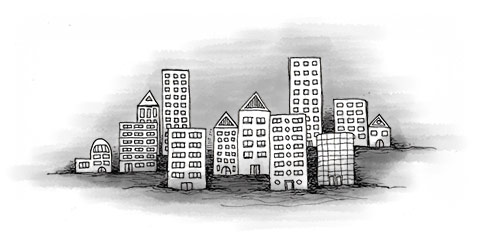Arab culture places great emphasis on relationships with extended family, so it is Arab tradition for relatives to live close to one another. In Oman, it is common to find three generations living together in a cluster of homes or villas. Oil-wealth makes housing readily available throughout the country, and even "poor" Omanis are often able to afford houses. Newly-wed couples receive low-cost housing loans, and in some cases these are given as "gifts" if the couple cannot afford them.
Foreign workers tend to live in either compounds or apartments.
The rapid development of the Omani economy and the sudden influx of foreign workers created sudden demand for large quantities of housing, to fill this demand, and block-style apartments were built across the country.
A ‘compound,’ meanwhile, is a group of houses or small apartment blocks within a walled enclosure, rather like a private estate. Different compounds have different combinations of nationalities. Some have a cosmopolitan mix, others contain people from one nation only or perhaps from a single social group or caste.
Depending on the size of the compound, facilities may include a communal swimming pool, a restaurant and shop, tennis and squash courts and even a gymnasium. Children might have an outdoor play area and there might be a form of community hall known as a majlis – the traditional Arab meeting area for visitors. Many compound houses are built in majlis style, with an area opening immediately from the front door where the men meet visitors and sit with them (in traditional Arab homes women are not seen by male visitors outside of important social functions.)
Separate apartment blocks, which tend to be higher than those within compounds, usually contain large numbers of expatriates. They generally lack the extensive facilities found in most compounds, however, and there may be fewer English-speaking people living in these apartment blocks than in some compounds.
On the other hand, compounds can be rather ghetto-like, with a claustrophobic ‘clubby´ atmosphere that isolates them from the rest of the community.
Quality of construction is high throughout the region, constantly improving as prospective landlords vie with one another to develop the most attractive properties. The average property is more spacious than its equivalent in Europe or the USA, so rooms are generally large in all types of accommodation. Many villas have generous patios and/or gardens. Homes are also normally better-maintained than in western countries (due to the wide availability of cheap maintenance labor).
If you own a car, which you probably will, make sure your home has a garage or covered carport.
With temperatures rising to 50oC (122oF) in the summer, a car left outside quickly becomes unbearably hot and the bodywork will deteriorate if exposed to the sun for too long. Most new apartment blocks have underground car parking facilities, while villas tend to have attached or covered garages.

